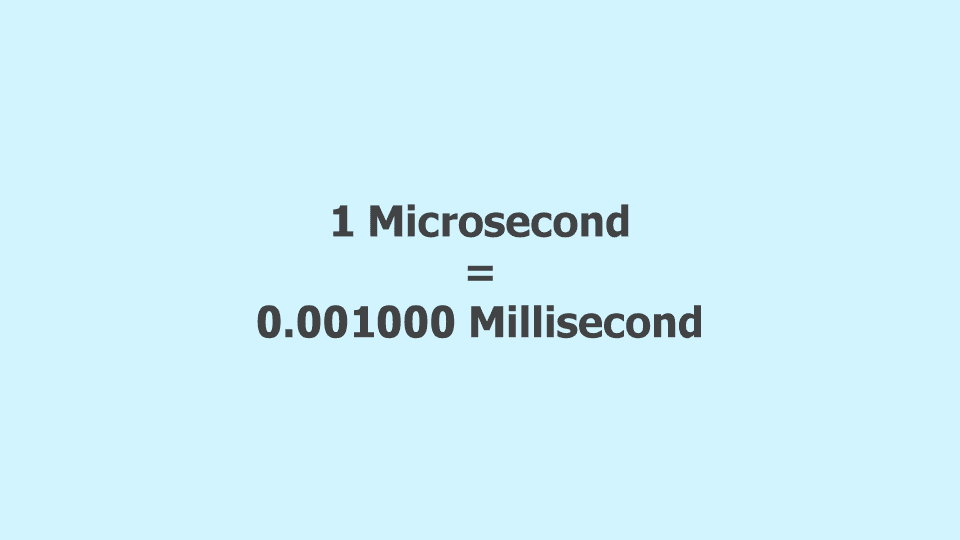Convert Microsecond (µs) to Millisecond (ms)
Please provide values below to convert Microsecond (µs) to Millisecond (ms).Time Converter
Convert from
Convert to
**Formula:
Discover Other Unit Converters
Updated on December 1, 2025
You can use our Microsecond (µs) to Millisecond (ms) conversion calculator as a reliable and efficient tool to simplify time conversions. It is designed for professionals, students, and anyone who needs a quick and accurate result. Conversion of Microsecond (µs) to Millisecond (ms) is crucial in Electronics timing related measurements. You can avoid the risk of manual calculation errors and save valuable time using our Microsecond (µs) to Millisecond (ms) converter.About Microsecond (µs) to Millisecond (ms) Conversion Calculator
Written By Nadiba Rahman
Nadiba Rahman
Reviewed by Mrinmoy Roy
Mrinmoy Roy
Share This Post
URL copied!
Relation Between Microsecond (µs) and Millisecond (ms)
Let me explain to you about the relation between Microsecond µs and Millisecond (ms) first before moving to the conversion process. Because it’s essential to grasp what these units represent.What is Microsecond (µs)?
A microsecond is a unit of time equal to one-millionth of a second (10⁻⁶ seconds). Microsecond (µs) is a unit of time measurement which is commonly used in Electronics timing. Microseconds are vital in high-precision systems like atomic clocks and telecommunications. In computing, they measure processing times and intervals. Although small, microseconds are larger than nanoseconds or picoseconds. Scientific measurements, particularly in physics, rely on this unit for accuracy..What is Millisecond (ms)?
Microsecond (µs) is another unit of time measurement that is used in Computer processing. A millisecond is a unit of time equal to one-thousandth of a second (10⁻³ seconds).. Microseconds are vital in high-precision systems like atomic clocks and telecommunications. In computing, they measure processing times and intervals. Although small, microseconds are larger than nanoseconds or picoseconds. Scientific measurements, particularly in physics, rely on this unit for accuracy..How to Convert Millisecond (ms)?
The conversion between Microsecond (µs) and Millisecond (ms) follows a simple formula:Microsecond = Microsecond × 0.001
Where, 0.001 is the value that allows you to convert between Microsecond (µs) and Millisecond (ms).
So,
1 Millisecond = 0.001 Microsecond
And, 1 Microsecond = 1/0.001 Millisecond

Examples of Converting Microsecond (µs) to Millisecond (ms)
To convert any value from Microsecond (µs) to Millisecond (ms), simply multiply the amount of Microsecond (µs) by the conversion factor:1 Millisecond = 0.001 Microsecond
For example, if you want to convert 5 Microsecond into Millisecond and the conversion factor is 0.001, then:
5 Microsecond = 5 x 0.001 Millisecond
Microsecond (µs) to Millisecond (ms) Conversion Chart
Here’s a quick reference chart for common conversions between Microsecond (µs) and Millisecond (ms)| Microsecond (µs) | Millisecond (ms) |
|---|---|
| 10 Microsecond (µs) | 0.01 Millisecond (ms) |
| 100 Microsecond (µs) | 0.1 Millisecond (ms) |
| 1000 Microsecond (µs) | 1 Millisecond (ms) |
| 10000 Microsecond (µs) | 10 Millisecond (ms) |
| 100000 Microsecond (µs) | 100 Millisecond (ms) |
| 1000000 Microsecond (µs) | 1000 Millisecond (ms) |
| 10000000 Microsecond (µs) | 10000 Millisecond (ms) |
| 100000000 Microsecond (µs) | 100000 Millisecond (ms) |
| 1000000000 Microsecond (µs) | 1000000 Millisecond (ms) |
| 10000000000 Microsecond (µs) | 10000000 Millisecond (ms) |
How 1 Microsecond (µs) Converts to Other time Units
See the relation between Microsecond (µs) and other time related measurement units:| 1 Microsecond(µs) | 0.000000 Day (d) |
| 1 Microsecond(µs) | 0.000000 Decade (dec) |
| 1 Microsecond(µs) | 0.000000 Fortnight (fn) |
| 1 Microsecond(µs) | 0.000000 Hour (h) |
| 1 Microsecond(µs) | 0.000000 Minute (min) |
| 1 Microsecond(µs) | 0.000000 Month (mo) |
| 1 Microsecond(µs) | 1000.000000 Nanosecond (ns) |
| 1 Microsecond(µs) | 1000000.000000 Picosecond (ps) |
| 1 Microsecond(µs) | 0.000000 Quarter (qtr) |
| 1 Microsecond(µs) | 0.000001 Second (s) |
| 1 Microsecond(µs) | 0.000000 Week (wk) |
| 1 Microsecond(µs) | 0.000000 Year (yr) |
Features of Our Microsecond (µs) to Millisecond (ms) Conversion Calculator
Our Microsecond µs to Millisecond (ms) converter is more than just a basic converter. Here's what makes it stand out:Output Precision Control
You can control how precise your conversion results are. From settings, you can adjust decimal places from 0 to 12 places.Customizable Rounding Options
You can control the output rounding options based on your necessity. You can turn the rounding mode on or off, and select between Ceiling or Floor rounding to match your needs.Multiple Number Formats
Display your results the way you want:- Standard format (e.g. 12.345245)
- Scientific notation (e.g. 1.23452e+1)
- Engineering format (e.g. 1.23452 × 10^1)

